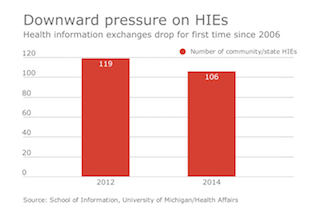Greg Slabodkin
See the following -
2017 Emerges as Pivotal Year for FHIR Interoperability Standard
 Health Level Seven International’s Fast Healthcare Interoperability Resources (FHIR) application programming interface is moving closer to becoming a mature standard, with the “normative” version slated for release sometime in 2017. Standards are widely perceived as providing the greatest potential for achieving national health IT interoperability in the near future. In particular, FHIR is seen by industry stakeholders as a promising solution to the complex interoperability challenges that are confronting healthcare organizations...
Health Level Seven International’s Fast Healthcare Interoperability Resources (FHIR) application programming interface is moving closer to becoming a mature standard, with the “normative” version slated for release sometime in 2017. Standards are widely perceived as providing the greatest potential for achieving national health IT interoperability in the near future. In particular, FHIR is seen by industry stakeholders as a promising solution to the complex interoperability challenges that are confronting healthcare organizations...
- Login to post comments
Docs Vastly Outperform Computer Algorithms in Diagnostic Accuracy
 The maxim “doctors know best” is getting support from a new study led by Harvard Medical School researchers that shows physicians made a correct diagnosis more than twice as often as 23 commonly used symptom checkers—websites and apps that help patients with self-diagnosis. The study’s results, published October 10 in the journal JAMA Internal Medicine, are being touted as the first direct comparison between human-made and computer-based diagnoses...
The maxim “doctors know best” is getting support from a new study led by Harvard Medical School researchers that shows physicians made a correct diagnosis more than twice as often as 23 commonly used symptom checkers—websites and apps that help patients with self-diagnosis. The study’s results, published October 10 in the journal JAMA Internal Medicine, are being touted as the first direct comparison between human-made and computer-based diagnoses...
- Login to post comments
HHS Offers Hurricane Guidance to Healthcare Facilities
With Florida still reeling from the effects of Hurricane Irma, a federal agency within the Department of Health and Human Services has issued draft guidance to help healthcare facilities with disaster planning and recovery for major hurricanes. Based on lessons learned from Hurricanes Katrina, Sandy, Harvey and others, the document—from the Office of the Assistant Secretary for Preparedness and Response—provides an overview of the “potential significant public health and medical response and recovery needs facing hurricane- and severe storm-affected areas.” Among the topics in the draft are those covering health information management...
- Login to post comments
HIT System to Help Clinics Serve Medically Underserved Populations
 Researchers at the University of Pittsburgh have developed an IT system to improve the health and well-being of medically underserved populations through personalized interventions. Called imHealthy, the system—which includes a mobile app, open source EHR and web portal—was specifically designed by a multidisciplinary research team for the FOCUS Pittsburgh Free Health Center. However, researchers are hoping the solution will serve as a model for free clinics in other major cities across the country. According to Leming Zhou, assistant professor in the Department of Health Information Management at the University of Pittsburgh, he and his colleagues intended imHealthy to be a user-friendly, scalable, easy-to-use system to help clinics provide a comprehensive well-being assessment for those living in medically underserved communities.
Researchers at the University of Pittsburgh have developed an IT system to improve the health and well-being of medically underserved populations through personalized interventions. Called imHealthy, the system—which includes a mobile app, open source EHR and web portal—was specifically designed by a multidisciplinary research team for the FOCUS Pittsburgh Free Health Center. However, researchers are hoping the solution will serve as a model for free clinics in other major cities across the country. According to Leming Zhou, assistant professor in the Department of Health Information Management at the University of Pittsburgh, he and his colleagues intended imHealthy to be a user-friendly, scalable, easy-to-use system to help clinics provide a comprehensive well-being assessment for those living in medically underserved communities.
- Login to post comments
How Apple’s Purchase of Startup Reveals Health Data Strategy
 Apple’s recent acquisition of health startup Gliimpse is the latest in a long series of strategic moves by the Cupertino, Calif.-based company to capture mindshare and market share in a healthcare industry increasingly reliant on data. News of the tech giant’s purchase of Gliimpse—a personal health record aggregator—did not come from Apple, which does not comment on its acquisitions or the strategy behind them. Reports of the acquisition first surfaced in Fast Company, a business magazine that covers the technology industry...
Apple’s recent acquisition of health startup Gliimpse is the latest in a long series of strategic moves by the Cupertino, Calif.-based company to capture mindshare and market share in a healthcare industry increasingly reliant on data. News of the tech giant’s purchase of Gliimpse—a personal health record aggregator—did not come from Apple, which does not comment on its acquisitions or the strategy behind them. Reports of the acquisition first surfaced in Fast Company, a business magazine that covers the technology industry...
- Login to post comments
Number of Public HIEs Drop, Bringing Viability into Question
 Despite federal funding that aided their creation, the number of community and state health information exchanges is declining as HIEs struggle to remain financially viable now that seed money has dried up. Those are among the results of a new national survey published in the July issue of Health Affairs that tracked community and state HIE efforts soon after federal funding ended. “We found 106 operational HIE efforts that, as a group, engaged more than one-third of all U.S. providers in 2014,” states the study’s authors...
Despite federal funding that aided their creation, the number of community and state health information exchanges is declining as HIEs struggle to remain financially viable now that seed money has dried up. Those are among the results of a new national survey published in the July issue of Health Affairs that tracked community and state HIE efforts soon after federal funding ended. “We found 106 operational HIE efforts that, as a group, engaged more than one-third of all U.S. providers in 2014,” states the study’s authors...
- Login to post comments
ONC Releases Beta Scorecard for C-CDA Documents
A new tool released by the Office of the National Coordinator for Health IT is being offered to providers and developers to help them identify and resolve interoperability issues involving Consolidated Clinical Document Architecture (C-CDA) documents in their HIT systems. Read More »
- Login to post comments
Precision Medicine Requires Unlocking Data from EHRs, Other Sources
Venture Funding for Digital Health in 2015 Reaches 2014 Level
Health information technology is “foundational” to President Obama’s $215 million Precision Medicine Initiative aimed at treating the specific needs and characteristics of individual patients, according to Karen DeSalvo, M.D., national coordinator for HIT. Read More »
- Login to post comments
Research Raises Questions About App Usability, Accessibility
While mobile health apps have the potential to help patients better manage their chronic conditions, consumers that would benefit most—the poor and minorities—are not able to access and use the technology to realize the benefits. That’s the finding of a new observational study published in the Journal of General Internal Medicine researching the impact of apps developed to enable adults to manage their chronic conditions...
- Login to post comments
Skilled Nursing Facilities Lag Acute Care Settings in EHR, HIE Use
The first nationally representative survey on electronic health record adoption and health information exchange among skilled nursing facilities has found that they are lagging behind acute care settings. While data released by the Office of the National Coordinator for Health IT shows that most SNFs (64 percent) used EHRs to manage patient health information last year and a fifth of facilities (18 percent) used both an EHR and a state or regional health information organization (HIO), a HIT gap persists with their acute care counterparts...
- Login to post comments
Stakeholders Look to Improve C-CDA as FHIR Matures
As the healthcare industry continues to wrestle with interoperability challenges, two standards are poised to play a central role in facilitating the electronic exchange of health information—one is a blunt tool for data sharing, while the other is a surgical instrument. First adopted in 2012 as part of the Office of National Coordinator for Health IT’s 2014 Edition final rule, the Consolidated Clinical Document Architecture (C-CDA) version 1.1—developed through the joint efforts of ONC and Health Level Seven (HL7) International—is now widely used among healthcare providers...
- Login to post comments
VA Lays Out Plans for Cloud-Based Digital Health Platform
 The Department of Veterans Affairs has developed a blueprint for a cloud-based technology platform that will integrate veteran data from VA, military and commercial electronic health records, as well as apps, devices and wearables, so that the information is available to providers in real time. While the VA is still finalizing plans for how it implements the Digital Health Platform (DHP), the agency has a strategy in place that is seen as the future path for providing next-generation healthcare to millions of the nation's veterans...
The Department of Veterans Affairs has developed a blueprint for a cloud-based technology platform that will integrate veteran data from VA, military and commercial electronic health records, as well as apps, devices and wearables, so that the information is available to providers in real time. While the VA is still finalizing plans for how it implements the Digital Health Platform (DHP), the agency has a strategy in place that is seen as the future path for providing next-generation healthcare to millions of the nation's veterans...
- Login to post comments
VA Seeks Information on EHR Replacement for VistA
The Department of Veterans Affairs has issued a request for information seeking industry feedback on how the VA might transition from its legacy electronic health record system to a commercial EHR. While it continues to modernize the decades-old Veterans Health Information Systems and Technology Architecture (VistA) system, the VA is having second thoughts about whether the legacy EHR is able to meet its needs going forward...
- Login to post comments